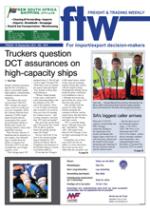The SA Association of
Freight Forwarders (Saaff)
has expressed concern
at some of the reasoning
in Transnet GCE Brian
Molefe’s recent comments
regarding vertical separation
of the SA rail network (FTW
September 9, 2011).
Referring to his statement
that South Africa’s singlecustodian
state ownership
of ports, rail and pipelines
is unprecedented globally
and that the country has
an institutional structure
for its port, rail and
pipeline network that is
internationally envied, they
comment:
Virtual monopoly
No doubt any envy emanates
from other suppliers of
logistics facilities that would
no doubt be only too happy
to have a virtual monopoly
on the movement of the
majority of a country’s
imports and exports.
The section stating:
“Separating railway
operations from network
planning and infrastructure
is not a new concept …and
that international experience
has demonstated that
separating operations from
network management has
not produced desired results”
was also rejected.
Experience of this
principle – clearly not
taken into account by the
author – appears quite
different, they said.
The liberalisation of rail
systems in many countries,
including the UK, has
been highly successful.
The introduction of private
operators in a liberalisation
programme proved
successful in that country
– and in Sweden, Germany,
Argentina and Brazil.
With private operators
running rail services in the
UK, passenger volumes
have increased from 750
million trips at the time of
liberalisation in the mid 90s
to 1.3 billion in 2008. The
UK’s private rail services
experience on-time arrival
rates at over 90%.
In complete contradiction
to Molefe’s comments,
liberalisation of rail services
allows private operators to
improve service, revenues,
passenger trips and
passenger satisfaction.
“Programmes to improve
operational efficiency are
already yielding results”
was also a point of some
argument from Saaff.
‘No material increase on
Durban-Jo’burg route’
There is no doubt that bulk
rail services such as the
Sishen-Saldhana operation
and the coal lines to
Richards Bay are a success
and the only viable means
of moving the required
volumes, the spokesmen
said. However, the Transnet
Freight Rail (TFR) efforts
to improve service on the
route between Durban
and Johannesburg, though
laudable, have seen no
material increase in volumes.
Transnet Port Terminal’s
(TPT’s) own figures for July
indicate that less than 19%
of import/export containers
handled at Durban container
terminal (DCT) Pier 2 are
moved by rail.
Molefe’s statement that
“The claim that South Africa
has the most expensive ports
in the world is alarmist,
careless and misleading” was
met with an equally abrupt
dismissal.
‘Every survey points to
SA’s high port costs’
The author clearly disagrees
with virtually every survey
conducted comparing ports
cost in South Africa with
those abroad including
that presented by the Ports
Regulator in 2010, said
Saaff.
The Transnet National
Ports Authority (TNPA)
and TPT tariffs to the
exporter for a 40-foot (12-
metre) container are: Cargo
Dues – R2015.65, and
terminal handling charge
(THC) – R1405.00, a total of
R3419.65 (US$489), not the
US$907 he indicates. This
compares with a benchmark
of overseas ports prepared
for the automotive industry
of US$265 per 40 ft (12 m)
container (2009 figures).
He fails to indicate that
cargo dues on an import
container are exactly double
– at R4056.13 – whereas
there is not generally a
differentiation elsewhere.
For a survey to find that
the performance of SA Ports
is “above average” really
does beg belief, said the
Saaff spokesmen.
Two statistics will suffice
to counter this description.
DCT Pier 2 gross crane
moves per hour: approx.
19 in 2011 whilst their own
target is 27. Container vessels
at anchorage off Durban
waiting to berth totalled 10
in the last week of August.
Molefe’s statement that:
“The key issue for SA and
Transnet is lowering the
total cost of logistics” was
met with a burst of complete
disbelief.
According to Saaff, for a
Transnet key performance
indicator (KPI) to be the
reduction of logistics costs,
one can only wonder why the
TNPA has requested a tariff
increase of 18.06% for fiscal
2012.
A likely conclusion from
the vast majority of port
and rail customers would
likely be that a state-owned
monopoly enterprise never
has, and never will, obtain
the levels of efficiency
needed in a modern economy
attempting to compete
internationally.
It is disappointing that the
GCE does not recognise that.
Clearly we will continue
to experience the frustrations
of high cost and poor
operational performance of
Transnet’s divisions.
Saaff speaks out against Molefe’s rail privatisation claims
16 Sep 2011 - by Alan Peat
0 Comments
FTW - 16 Sep 11

16 Sep 2011
16 Sep 2011
16 Sep 2011
16 Sep 2011
16 Sep 2011
16 Sep 2011
16 Sep 2011
Border Beat
Poll
Featured Jobs
New
